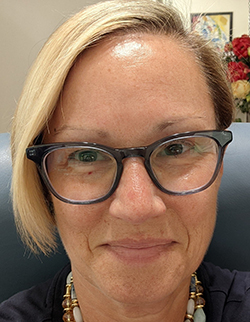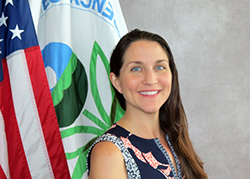Leveraging Resources for Brownfields Revitalization: Meet the Funders - Finance
Sponsored by: U.S. EPA Office of Brownfields and Land Revitalization
Archived: Tuesday, April 25, 2017
Leveraging Resources for Brownfields Revitalization: Meet the Funders - Finance
2017-04-25
U.S. EPA Office of Brownfields and Land Revitalization
This "Meet the Funders" webinar will highlight tax and financing incentives available to communities that pursue brownfield redevelopment projects. Speakers from the National Development Council, the Federal Housing Finance Agency, and the Council of Development Finance Agencies (CDFA) will discuss tax incentives, including Tax Increment Financing, New Market Tax Credits, Affordable Housing Community Investment funds, credit and lending support, and other financing tools. A CDFA representative will discuss the EPA-supported technical assistance it can provide to brownfield communities. The webinar will also showcase examples of communities that have successfully used one or more of these resources for their revitalization efforts. It is the fifth in OBLR's webinar series on what communities need to know to successfully leverage resources for brownfields revitalization.
Agenda:
- Welcome: Andrew Seth, President, Sustainable Strategies DC
- Introductory Remarks: Patricia Overmeyer, Land Revitalization Coordinator, U.S. EPA
- New Market Tax Credits, Low-Income Housing Tax Credits, Historic Preservation Tax Credits, & 63-20 Bonding for Public-Private Partnerships: Kevin Gremse, Team Leader, National Development Council
- Affordable Housing and Community Investment Programs: Ken Willis, Vice President, Federal Home Loan Bank of Boston
- Tax Increment Financing & Financing Technical Assistance: Emily Moser, Program Manager, Council of Development Finance Agencies
Accessibility, Recording, and Content Disclaimer
Rehabilitation Act Notice for Reasonable Accommodation
It is EPA's policy to make reasonable accommodation to persons with disabilities wishing to participate in the agency's programs and activities, pursuant to the Rehabilitation Act of 1973, 29 U.S.C. 791. Any request for accommodation should be made to Patricia Overmeyer at 202-566-2774 or overmeyer.patricia@epa.gov, preferably one week or more in advance of the webinar, so that EPA will have sufficient time to process the request. EPA would welcome specific recommendations from requestors specifying the nature or type of accommodation needed. Please note that CLU-IN provides both alternate phone call-in options and closed captioning for all webinars, and requests for these specific accommodations are not necessary.
Webinar Recording
By participating in this CLU-IN webinar, you automatically agree to authorize recording of audio and visual content presented during this live event and consent to subsequent use of this recording in the public domain by the U.S. Environmental Protection Agency. This recording may include questions, comments and poll responses provided by you during the live event in addition to your name, voice, image or likeness. This recording will be made available after the conclusion of the live event as part of the CLU-IN webinar archives, and will remain available indefinitely. If you do not wish to consent to the recording, please do not join the live event, and contact Jean Balent at 202-566-0832 or balent.jean@epa.gov to discuss your concerns.
Content Disclaimer
This webinar is intended solely to provide information to the public. The views and opinions expressed as part of this webinar do not necessarily state or reflect those of the U.S. Environmental Protection Agency. It is not intended, nor can it be relied upon, to create any rights enforceable by any party in litigation with the United States, or to endorse the use of products or services provided by specific vendors. With respect to this webinar, neither the United States Government nor any of their employees, makes any warranty, express or implied, including the warranties of merchantability and fitness for a particular purpose, or assumes any legal liability or responsibility for the accuracy, completeness, or usefulness of any information, apparatus, product, or process disclosed, or represents that its use would not infringe privately owned rights.
Presenters:
Andrew Seth, Sustainable Strategies DC (andrew.seth@strategiesdc.com or 202-261-9881)
 Patricia Overmeyer, U.S. EPA, Office of Brownfield and Land Revitalization (overmeyer.patricia@epa.gov or 202-566-2774)
Patricia Overmeyer, U.S. EPA, Office of Brownfield and Land Revitalization (overmeyer.patricia@epa.gov or 202-566-2774)
Patricia Overmeyer is the acting deputy director of the U.S. Environmental Protection Agency's Office of Brownfields and Land Revitalization (OBLR). She coordinated the Agency's development of federal regulations setting standards and practices for conducting "all appropriate inquiries." Ms. Overmeyer also managed the EPA task force that developed policy and guidance on the definition of a "brownfield site," in accordance with the provisions provided in the Small Business Liability Relief and Brownfields Revitalization Act. Prior to joining EPA's Office of Brownfields Cleanup and Redevelopment, Ms. Overmeyer worked in EPA's Office of Solid Waste, in the Hazardous Waste Identification Division.
Ms. Overmeyer earned an M.S. from Carnegie-Mellon's School of Urban and Public Affairs (now the Heinz School) and has a B.A. in economics from Indiana University of Pennsylvania
Kevin Gremse, Team Leader, National Development Council (kgremse@ndconline.org or 212-682-1106)
 Ken Willis, Vice President, Federal Home Loan Bank of Boston (kenneth.willis@fhlbboston.com or 888-424-3863)
Ken Willis, Vice President, Federal Home Loan Bank of Boston (kenneth.willis@fhlbboston.com or 888-424-3863)
Kenneth is currently First Vice President and Director of Housing and Community Investment at the Federal Home Loan Bank of Boston, where he is responsible for implementing the Bank’s strategic vision for administering housing and community investment programs, processes, compliance and reporting. In addition, he is responsible for designing and conducting community development outreach activities that educate and promote effective working relationships with lenders, state, and local housing-finance agencies, development organizations, nonprofit organizations, state and local officials and others that are involved in affordable housing and community economic development.
Before joining the Federal Home Loan Bank of Boston, Kenneth was a CRA (Community Reinvestment Act) loan officer, residential mortgage originator, and underwriter for the formerly Bank Boston, where he gained expertise in developing and implementing special community development lending programs.
Kenneth graduated magna cum laude from Eastern Nazarene College in Massachusetts with a Degree in Business Administration. Subsequently, Kenneth received his MBA from the University of Maryland (College Park) in Maryland. Kenneth also received a Graduate Certificate in Financial Services from the New England College of Finance/ U.C. Berkeley with Distinction.
Kenneth also serves on the board of directors for the Boston Society of Architects Foundation, Citizens Housing and Planning Association, Inc., Family Nurturing Center of Massachusetts, and the Roxbury YMCA.
Emily Moser, Program Manager, Council of Development Finance Agencies (emoser@cdfa.net or 614-705-1305)
Moderators:
Andrew Seth, Sustainable Strategies DC (andrew.seth@strategiesdc.com or 202-261-9881)
 Jean Balent, U.S. EPA Technology Innovation and Field Services Division (balent.jean@epa.gov or 202-566-0832)
Jean Balent, U.S. EPA Technology Innovation and Field Services Division (balent.jean@epa.gov or 202-566-0832)
Ms Balent is on the staff of the EPA's Technology Innovation and Field Services Division where she has worked to collect and disseminate hazardous waste remediation and characterization information since 2003. Ms Balent manages the Clean Up Information Network website and actively supports online communication and collaboration resources available to EPA. She formerly worked with the US Army Corps of Engineers Environmental Engineering Division in the Buffalo District. Ms Balent was also a member of the SUNY-Buffalo Groundwater Research Group where she constructed and tested large scale models of groundwater flow. Ms Balent has also conducted research relating to the Great Lakes, environmental remediation, and brownfields re-development. She holds a Bachelor's degree in environmental engineering from SUNY-Buffalo and a Master's degree in Information Technology from AIU.
Webinar Slides and References:
Webinar Slides and References:
Additional Resources:
- CDFA Brownfields Technical Assistance Program
- New Markets Tax Credit Programs, NDC
- Federal Housing Finance Agency
- Past "Meet the Funders" webinars archived on clu-in.org:
- Brownfields Area-Wide Planning Federal Resources Matrix (230KB/MS Excel): This spreadsheet is designed to be a tool that helps Brownfields Area-Wide Planning (BF AWP) grantee communities better understand the range of possible plan implementation resources available through federal government programs. If acquired, these resources can help BF AWP grantees make progress on their brownfields site assessment, remediation and community revitalization activities.
- Setting the Stage for Leveraging Resources for Brownfields Revitalization: This guide was developed by EPA to assist communities in overcoming the challenges of making sound investment decisions to attract additional resources for brownfields redevelopment projects and community revitalization. Sound initial investments of local funds can open opportunities for additional public funds and attract the interest and support of outside investors and lead to additional funding.
- 2015 Brownfields Federal Programs Guide: This document illustrates how the Brownfields Program does more than simply address environmental contamination—it recognizes that a community's quality of life goes hand-in-hand with economic development and sustainability, and encourages communities to develop and implement their own vision for community revitalization.
- EPA Brownfields Program
- EPA Land Revitalization Program
- Superfund Community Involvement Tools and Resources: This page provides links to the Superfund Community Involvement Toolkit and Handbook, as well as additional resources and information on how to use them.
- Types of Brownfields Grant Funding: EPA's Brownfields program provides direct funding for Brownfields assessment, cleanup, revolving loans, and environmental job training. This page describes each of the grant programs, and provides information on availability, requirements, and how to apply.
- Land Revitalization Program Tools for Communities: This fact sheet highlights some of the tools that have resulted from the regional community-based projects undertaken with assistance from the Land Revitalization Program. These useful tools can be adapted for use in other communities.
- Technical Assistance to Brownfields Communities: EPA is committed to providing technical assistance and resources to help small, rural, environmental justice, and other community stakeholders with the necessary technical assistance to aid in the assessment and cleanup of Brownfields properties. This page describes programs that currently provide this type of assistance and conduct research projects designed to help communities address brownfields.
- ATSDR Brownfield/Land Use Health Initiative: Community health considerations are important parts of ATSDR's land revitalization activities. As such, through its Brownfields/Land Reuse Health Initiative, ATSDR works to promote a well-rounded approach to redevelopment, include health as an important part of redevelopment, grow community resources to promote health, measure changes in community health, encourage early community involvement in decision making, restore and revitalize communities in a way that is fair to all community groups, promote relationships among, agencies, partners, and communities, and improve ways to talk about health and environmental risks.
- Council of Development Finance Agencies (CDFA): CDFA provides ongoing technical assistance on funding and financing resources available to brownfields communities.
If you have a suggested topic or idea for a future CLU-IN internet seminar, please contact:
Technology Integration and Information Branch
PH: 202-566-0832 | Email: balent.jean@epa.gov
Technology Integration and Information Branch
PH: 202-566-0875 | Email: adam.michael@epa.gov





